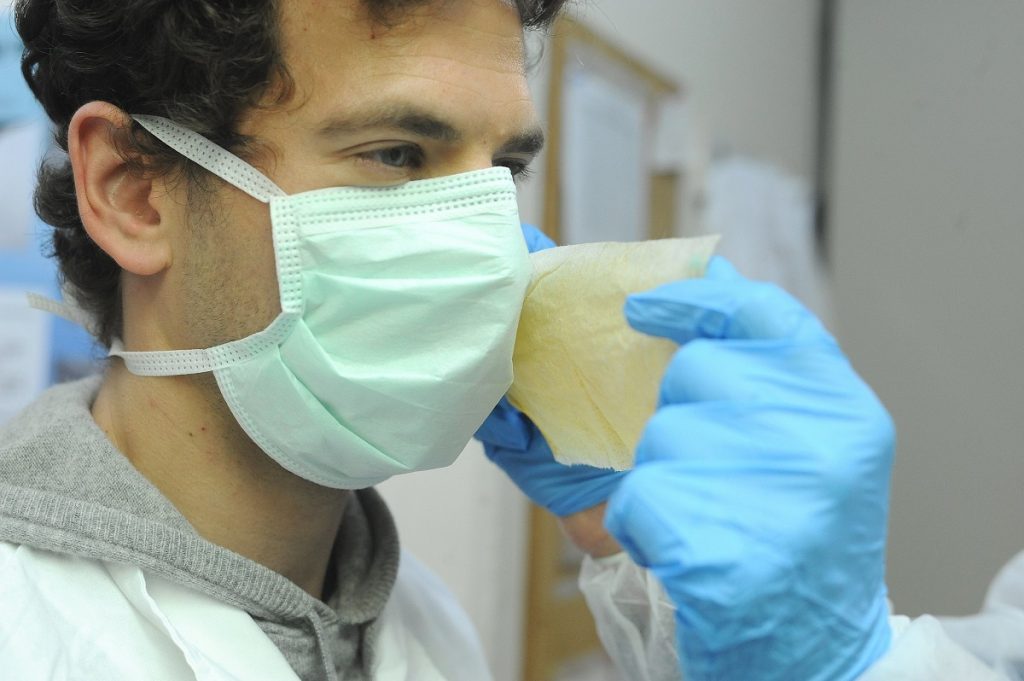Hospitals across Israel are piloting an anti-viral sticker that attaches to surgical masks to provide better protection to medical staff during the COVID-19 crisis.
The 3D-printed nanotech sticker, dubbed “Maya”, was developed at the Technion – Israel Institute of Technology by a research team led by Professor Eyal Zussman of the Technion’s Faculty of Mechanical Engineering in collaboration with the COVID-19 National Emergency Team of the Defense Ministry’s Directorate of Defense R&D (DDR&D) and the Galilee Medical Center in the northern Israeli town of Nahariya.
Prof. Zussman tells NoCamels that pilot trials are being conducted at several medical centers across the country including Rambam Health Care Campus and Bnai Zion Medical Center in Haifa, Ziv Medical Center in Safed, Ichilov Hospital in Tel Aviv, Shaarei Zedek Medical Center in Jerusalem and at the Galilee Medical Center, which was the first hospital to test the stickers, after it was granted preliminary approval by the Health Ministry.
“We spread a couple of hundred stickers to medical staff along with a questionnaire asking about the adaption of the mask,” Prof. Zussman tells NoCamels of the pilot in Nahariya, “The pilot will be led by Prof. Samer Srouji.”
Prof. Srouji, director of oral surgery at the Galilee Medical Center, also partnered with Prof. Zussman’s team, and scientists from the Chemical and Biological Section of the DDR&D, led by Dr. Dan Greenstein, in the development of the sticker.
“The main purpose of this sticker is to provide extra protection for medical teams now battling the coronavirus,” said Prof. Srouji said in a Technion video.
An extra layer for medical mask
As the coronavirus began to spread in Israel in February, Prof. Zussman spoke with friends who were physicians at the Rambam Health Care Center and other hospitals.

“Not only was there a lack of face masks, but medical staff were wearing common surgical masks [to treat contagious coronavirus patients] that you could find anywhere,” he says.
These surgical masks are typically worn so that the hospital patient can avoid infection by the doctor, he explains. But medical staff have a high risk of contracting the virus.
The surgical masks alone, says Prof. Zussman, “cannot really protect you from coronavirus.”
Sign up for our free weekly newsletter
SubscribeSARS-CoV-2, which causes the disease known as COVID-19, can be transmitted when a person is in close contact (within a meter) with someone who has respiratory symptoms (e.g., coughing or sneezing) and is therefore at risk of having his/her mucosae (mouth and nose) or conjunctiva (eyes) exposed to potentially infective respiratory droplets, according to the World Health Organization (WHO).
The “Maya” sticker is a new concept to upgrade surgical masks, Prof. Zussman says. “First and foremost, its job is to protect the medical mask.”
The sticker, which looks like an exaggerated label, is fixed to the outer surface of the medical mask, providing extra protection to the medical mask.
The adhesive is printed using a special 3D printing technique developed by the Technion team and is made up of nanometric fibers coated with disinfectants. It is meant to enhance the containment of nanoparticles and effectively neutralize viruses as they touch the mask, according to a Technion statement.
“Droplets are absorbed into the fiber network and the virus is trapped. The sticker has an antiseptic agent. It is coated with a biocide that is released and makes the virus ineffective,” says Prof. Zussman.
Zussman says there are plans to commercialize this sticker and to scale up, noting that the product is already being used in a large Israeli company that he declined to name. While the sticker is only in Israel for the time being, it has drawn attention from countries like Mexico, Colombia, China, Korea, Australia, and the US.
“I believe our sticker is a very practical solution for medical staff,” he says.
As for the general population, Zussman does believe wearing a scarf or a mask over the nose and mouth is better than nothing. “It doesn’t matter what kind of textile is good enough. We can’t quantify the efficiency if we don’t have the means. Take a sticker and put it over your masks for extra protection. It’s an extra layer, simple as that.”
Related posts

Israeli Medical Technologies That Could Change The World

Harnessing Our Own Bodies For Side Effect-Free Weight Loss

Missing Protein Could Unlock Treatment For Aggressive Lung Cancer




Facebook comments